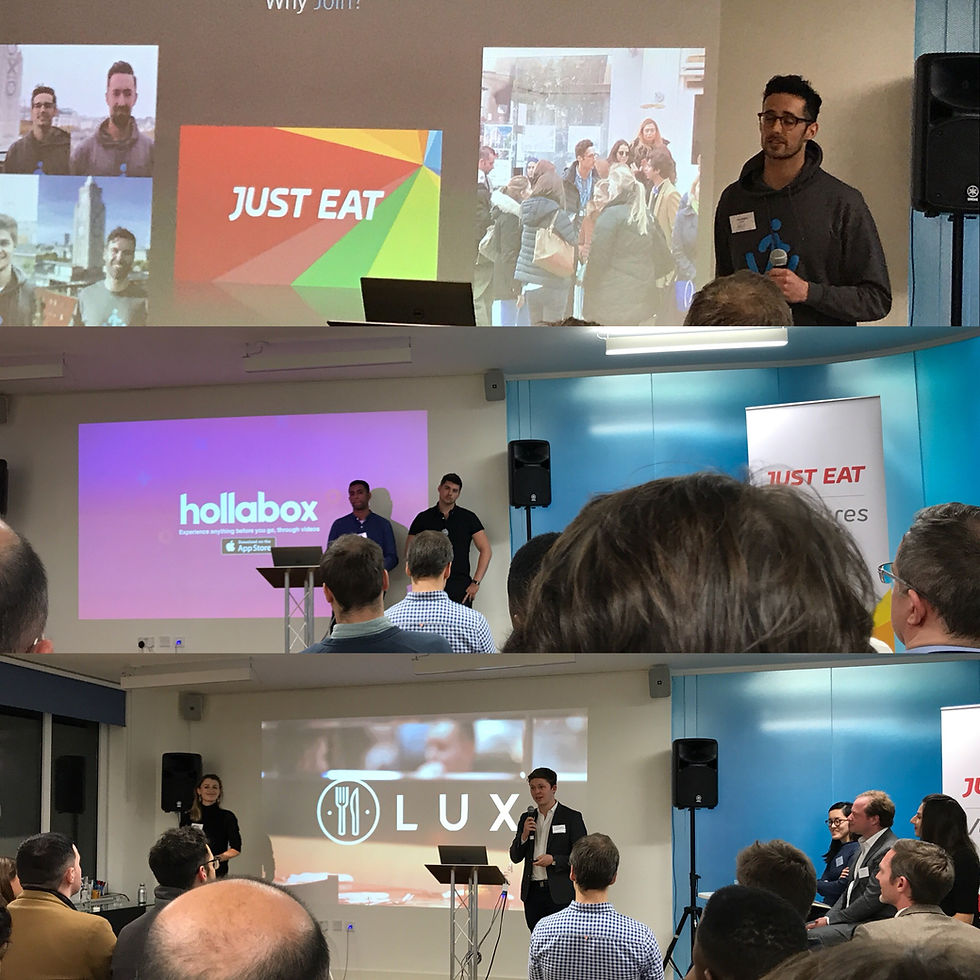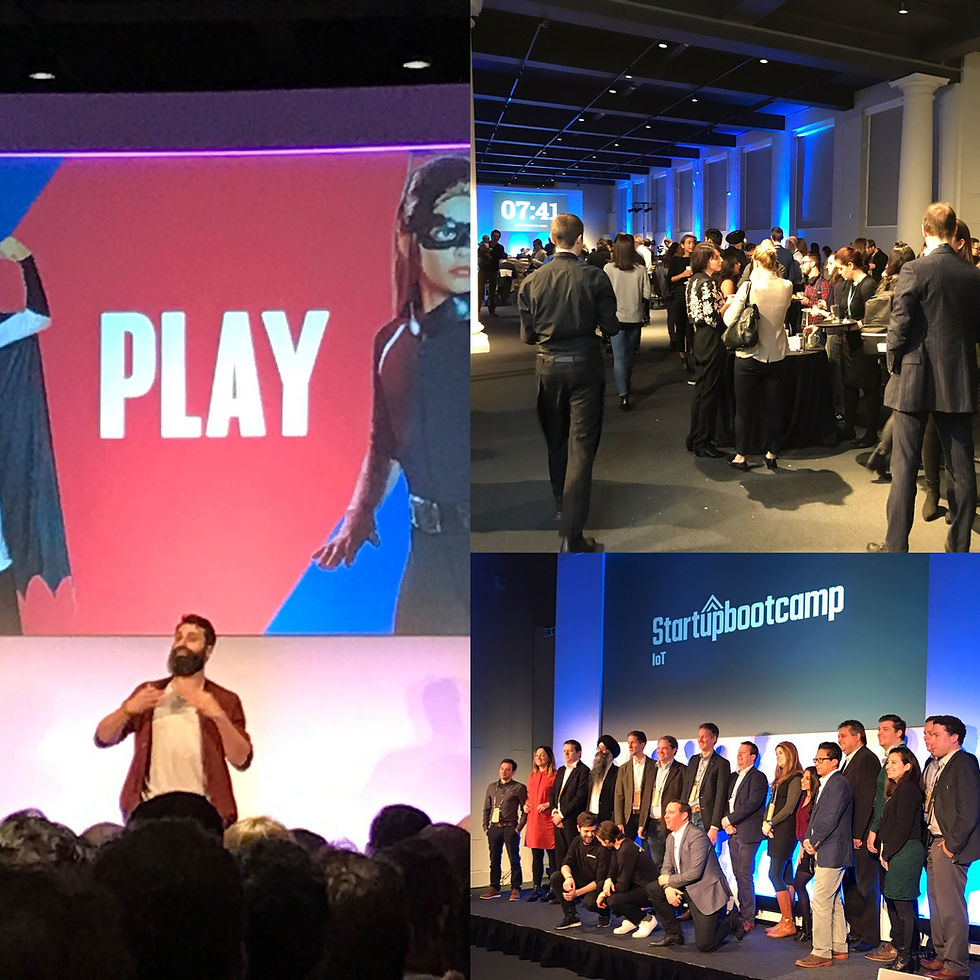How do Demo Days by three London accelerators compare and contrast?
- John Welsh

- Mar 23, 2018
- 5 min read
Central Research Laboratory, Startupbootcamp IoT and Just Eat Ventures boasted similar energy but how did venues, pitches, gender balance and social media rate?
Venues
What are the basics needed for a Demo Day venue? As a finale to all the hard work of the startup founders participating in an accelerator's programme, the event is both a review of progress but also a celebration. A stage on which to pitch and a space for the founders to meet investors, mentors, family and friends are essential. In addition, just like fashion shows, the more characterful the venue (and probably the bigger the budget), the more the impact on attendees. My ratings balance character with practicality.

Startupbootcamp IoT took place in Level 1 in the Science Museum, a gallery-like space often used for fashion shows. It gave the event a finished, even glamorous ambiance. The location within the museum provided us with the rare opportunity to walk through the museum before it opened to the public. Rating 10/10
Central Research Laboratory had hired out the ground floor of the headquarters of Victoria-based developer U+I, which is also a supporter of the accelerator and the developer of its base in Hayes. The space is dominated by the original, cast iron pillars and is big enough for all the startups to present their products on tables around the perimeter of the space. Rating 9/10
Just Eat Ventures had taken over the top floor of Wallacespace in Shoreditch for the actual Demo with drinks served at a lower level in the same building. The Demo space was pretty straightforward but what it lacked in character, it made up for in practicality. Rating 8/10
Pitches
The most challenging part of a Demo Day for me is getting my head round a product or service - from know nothing at all at the start of a pitch to understanding what it actually does and what need it meets in a few minutes - before the next founder comes on stage and we start all over again. My ratings indicate how well the structure of the Demo Day helped me to understand the products and service in the limited time available.

Just Eat Ventures' Seed Programme Showcase numbered only three startups and all were early stage. But the pitches were still impactful and polished, despite founders having less experience than founders at CRL or Startupbootcamp IoT.
Each pitch was followed by a question and answer session, led by Rekha Mehr, one of the three who run Just Eat Ventures, and two others. Questions were also asked by attendees. It was a great way to further out understanding of the founder's thinking, even after the actual pitch had ended. But the device would not work for more than, say, five pitches at one Demo Day. Rating 9/10
Startupbootcamp IoT gave a rousing musical introduction to each founder. All pitches were slick and polished, using the classic pitch structure.

Every attendee received a programme, bearing their name, that doubled as a lanyard. Each startup had a short write-up in the programme. As pitches followed in quick succession, the summaries got my head around what were nine very different products. Rating 9/10
Central Research Laboratories, as a hardware accelerator, has a real advantage over software accelerators in that founders have a product rather than a service to show people. So while founders at Startupbootcamp IoT or Just Eat Ventures stood in front of roll-up banners to explain their services to people at the beginning and end of the event, founders at CRL had been proudly demonstrating their products over table tops around the perimeter of the room before the pitches started.

So when it came to the pitches, I felt I knew both founders and their products before they even stood up. When they did finally pitch, it was as if their time was just an excuse for yet another demonstration. It made for a very different atmosphere than usual Demo Day reminding me of end of year degree shows at the Royal College of Art or St Martins. Rating 9/10
Gender balance
What was the gender balance at the Demo Days? One comparison might be Techstars London 2017 cohort where seven out of the 11 were women, something former MD Max Kelly called out in his introduction to its Demo Day (03:06). My ratings indicate gender balance of both founders pitching but also others taking to the stageduring the event.
Central Research Laboratory boasted a 50:50 male:female ratio of founders pitching during the Demo Day. Rating 10/10
All three founders of Just Eat Ventures early stage startups were male but one founder shared the stage with a female colleague. And the question and answer panel had two women to one man. Rating 8/10
Startupbootcamp IoT had an all-male line up of founders but a post-pitch line-up revealed a more diverse group who could have participated in pitches or the opening/closing of the event itself Rating 5/10

Social media
I don't know the social media marketing strategy of the three accelerators. So my ratings below are based on an assumption that the primary goal is to raise the accelerator's profile with startup founders who are potential candidates for a future programme.
Central Research Laboratory boasted a lively presence on Twitter during the evening with several founders, the accelerator itself and Mat Hunter, the MD Tweeting, liking Tweets by others and reTweeting. Coverage of the Demo Day was picked up by Startups Magazine and Tweeted out.
One of my Tweets, that was liked and reTweeted on the evening, did gain a high number of impressions for my feed, see below. I did not post to LinkedIn.

Five days after the Demo Day, the accelerator used Twitter to remind potential applicants of the closing day for its next programme, suggesting Twitter is a key tool in its social media strategy to raise its profile with potential applicants. Rating 8/10
Startupbootcamp IoT referred to its Instagram and Facebook feeds during the event.
I used Twitter and had four of the pitching startups and/or their founders "like" my Tweets (Acceleron, StoryBots, Sonodots and VoxSmart). Raph Crouan, the Founder and MD of Startupbootcamp IoT tweeted out pictures of the room before we all arrived. Startupbootcamp IoT's Twitter was not active in the room.
I posted the composite photo of the Demo Day (above) on LinkedIn with eight out of the nine founders tagged (one of the founders was not on LinkedIn). Six of the eight founders, liked the photo (Squad Robotics, Sonodot, Mothive, Odyssey Sensors, ThingBlox ad Hudlog) and raph Crouan. The post generated the second highest number of views for a post in my LinkedIn feed, likes and, even, the start of a discussion with one of the founders (below).

If 75% of the founders liked the photo on LinkedIn, is Startupbootcamp IoT making the most of the opportunity to raise the accelerator's profile with the alumni's peers by focusing on Instagram and Facebook? For every follower of every founder that liked the photo on LinkedIn would have seen it Rating 7/10
Just Eat Ventures had little social media activity. It was impossible to find one of the three founders online let alone on social media.
Perhaps Foodtech operates within a sufficently niche environment that Just Eat Ventures knows which startups matter without much need of reaching out. But I'd argue that the approach risks missing out on attracting those startups that might not see themselves as belonging to Foodtech but could bring the next big thing. Rating 6/10
Dates
Just Eat Ventures Seed Programme 14th December 2017
Startupbootcamp IoT 24th January 2018
Central Research Laboratory 25th January 2018






Comments